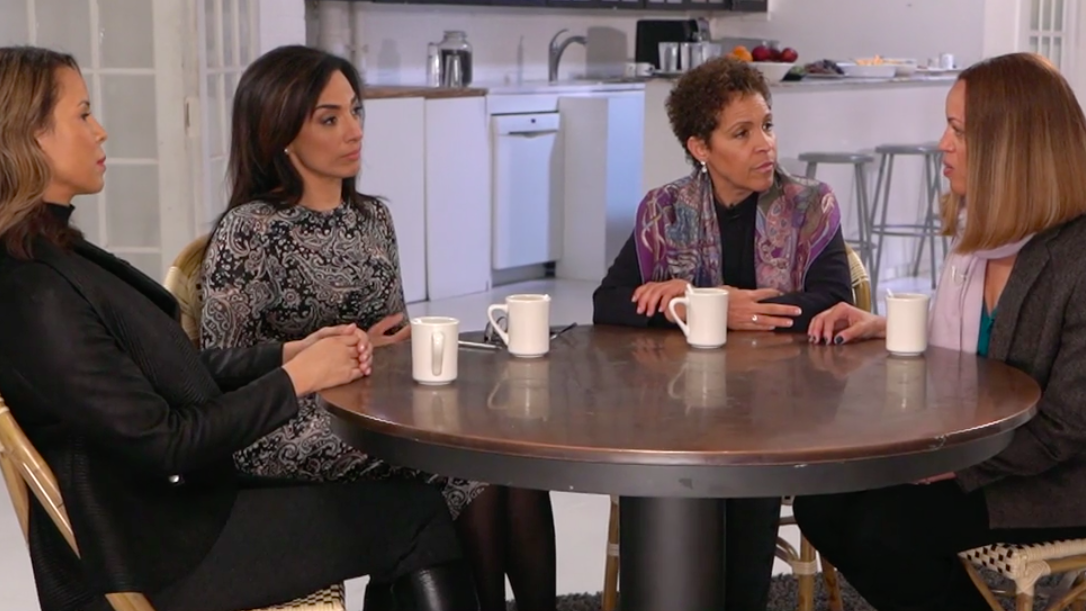Three women accusing Russell Simmons of rape spoke out Wednesday in an interview with CBS This Morning, tearfully recounting their claims and highlighting Simmons' widespread media campaign against them.
First on @CBSThisMorning: We're hearing from women interviewed for a new documentary who claim music mogul Russell Simmons violently assaulted them.@CBSMMiller spoke to three of the women in the documentary.
Simmons has denied the allegations. https://t.co/nd8J02H4HJ
pic.twitter.com/2TliAIFgG6— CBS This Morning (@CBSThisMorning) January 15, 2020
Drew Dixon, Sil Lai Abrams and Alexia Norton Jones spoke with CBS News correspondent Michelle Miller on Wednesday to discuss the coming documentary about what happened to them and their view on the larger problems facing Black women and girls when it comes to rape and sexual assault.
The untitled documentary is slated for release on January 25 and will also be featured at Sundance Film Festival.
Dixon said her claims against Simmons were far beyond sexual harassment or misconduct and were specifically about him violently raping her in 1995 when she was one of his employees.
"This is violently tackled and raped — while saying no and fighting and crying. I literally worked for him. He was ordering me a car, and he told me to come upstairs and pick up a demo. I thought I would be in his apartment for five total minutes. That's it. And he showed up naked, wearing a condom, and tackled me to his bed, while I screamed and fought and said, 'No,' and cried. That's rape," Dixon told Miller.
"I hope that Black women and girls become more visible as a result of this documentary," Dixon added.
Each of the women recounted the situation around their rapes, tearfully taking Miller through the situations that led to them being attacked by Simmons.
Abrams said Simmons forced himself on her when she was too drunk to consent in 1994 and that the situation almost led her to take her own life.
"He'll say, 'Yes, we had a sexual relationship,' but he cannot address the fact that I was too drunk to consent, and that the next day I called him up, screaming. And I attempted suicide. He knew," Abrams said. "And I told him why, that he had ruined my life, and that I had nothing."
Jones echoed those comments and told Miller that Simmons raped her during their only date in 1991. She said she actually liked Simmons and would have kissed him but was horrified when he forced her against a wall and raped her.
"I liked Russell. I would've kissed him, I would've made out with him…he didn't have to attack me," she said tearfully.
Throughout the interview, each woman acknowledged the reasons why people, especially those in the Black community, may be reluctant to believe them. Simmons cannot be charged for the rapes because they are past the statute of limitations, but each woman felt it was their duty to publicize what happened to them so that other Black women felt comfortable coming forward.
Dixon specifically said she felt compelled to tell her story after dozens of women spoke out against movie producer Harvey Weinstein.
"It felt like this portal opened suddenly, where women were being believed, and I wondered if that would apply to Black women. It was like carrying a malignant cancer. I'm just relieved to be done enabling him essentially by not telling people what he did," Dixon said, adding that she understood why people felt the need to question their claims.
"Black people have very few heroes to spare. Not many of us get to the level of success of a Russell Simmons, which is why I was so proud of him," Dixon noted.
In his own statement to CBS, Simmons denied the claims made by the three women, saying he has "issued countless detailed denials of the false accusations against [him]."
CBS News reached out to Russell Simmons to request the witness testimony and sworn statements mentioned in the statement below, but were told he "will not release these documents to media outlets at this time.” https://t.co/FXmJbr2wHV
pic.twitter.com/8hg08ub5wy— CBS This Morning (@CBSThisMorning) January 15, 2020
"I have admitted to being a massively unconscious 'playboy' which today is appropriately titled 'womanizer.' Continuing to live my life honorably as an open book for decades, devoid of any kind of violence against anyone, as has been documented and examined in detail worldwide since the very early days of hip hop, which is my life's testimony and work," Simmons said.
"What I won't do is engage in a shootout of attacks and counter-attacks. The social change from today's activism is more important to the world my daughters will inherit than any dirt from false accusations from nearly 40 years ago," he added.
Dixon, Abrams and Jones are only a few of the women who have accused Simmons of either rape, sexual assault or sexual misconduct. To avoid facing the claims, he has spent most of his time since 2017 living in Bali, occasionally returning to the United States to deny the allegations against him.
The film has been shrouded in controversy since producer Oprah Winfrey decided to step away from it following a very public media campaign led by Simmons and other Black male celebrities. Stars like 50 Cent bashed Winfrey for her involvement in the film, but even after removing herself from the movie, she said she believed the women.
During the CBS segment, host Gayle King defended Winfrey's decision, claiming the billionaire felt the film "needed more context about the time period where the allegations took place" and that the film needed more accusations from other women.
In 2018, Winfrey removed all of Simmons' passages from her book, which involved meditation and his thoughts on abundance and wealth.
